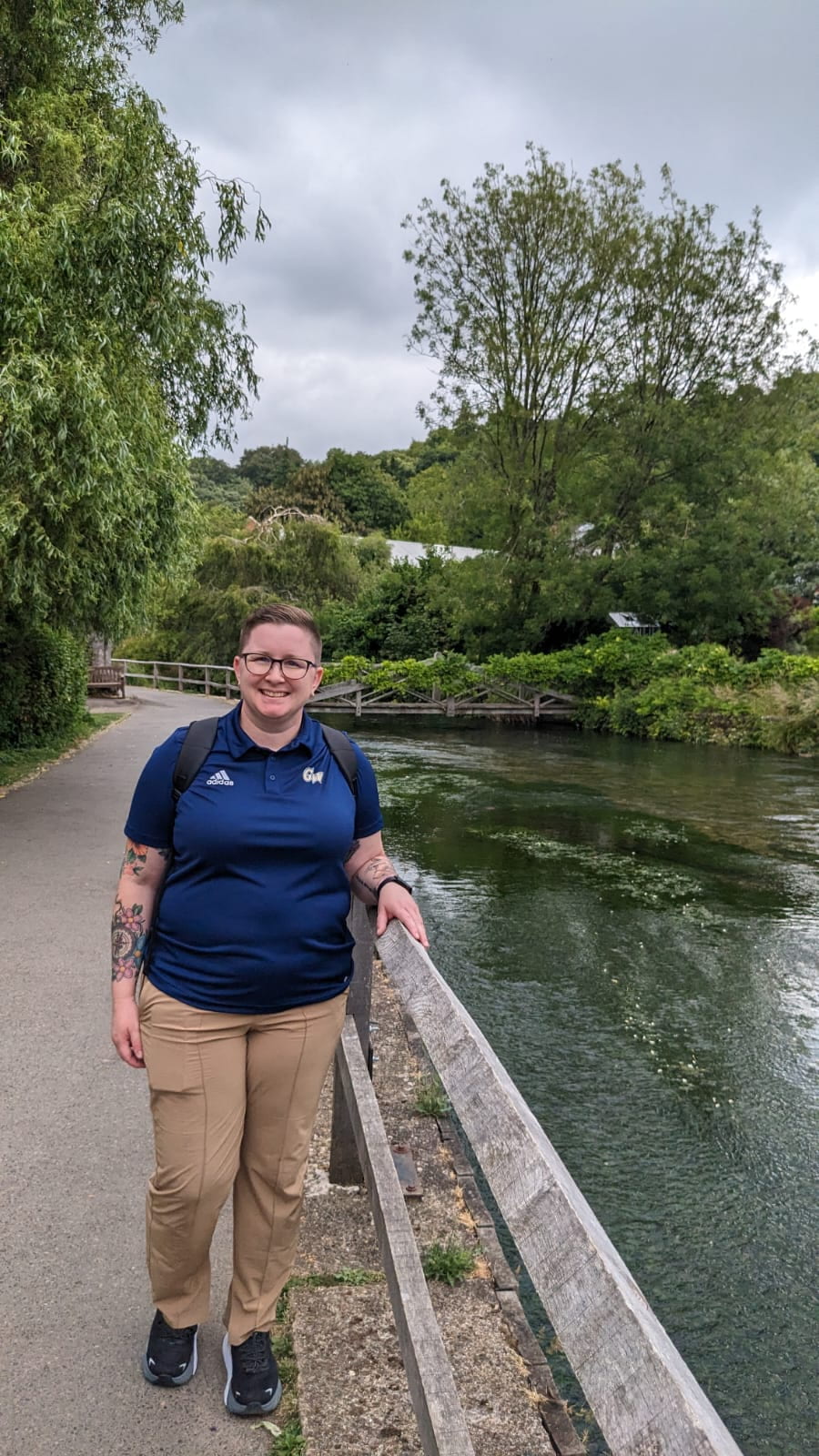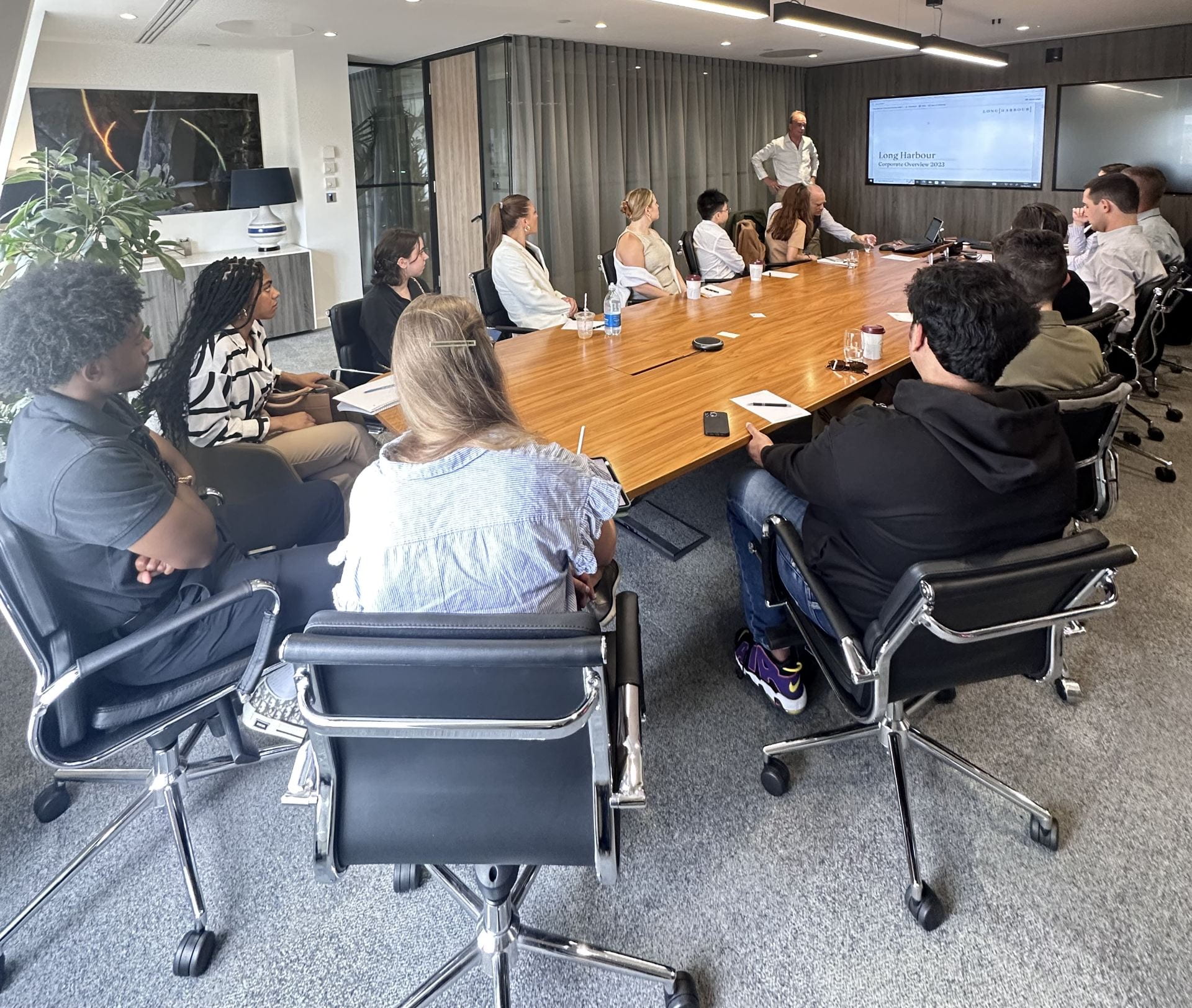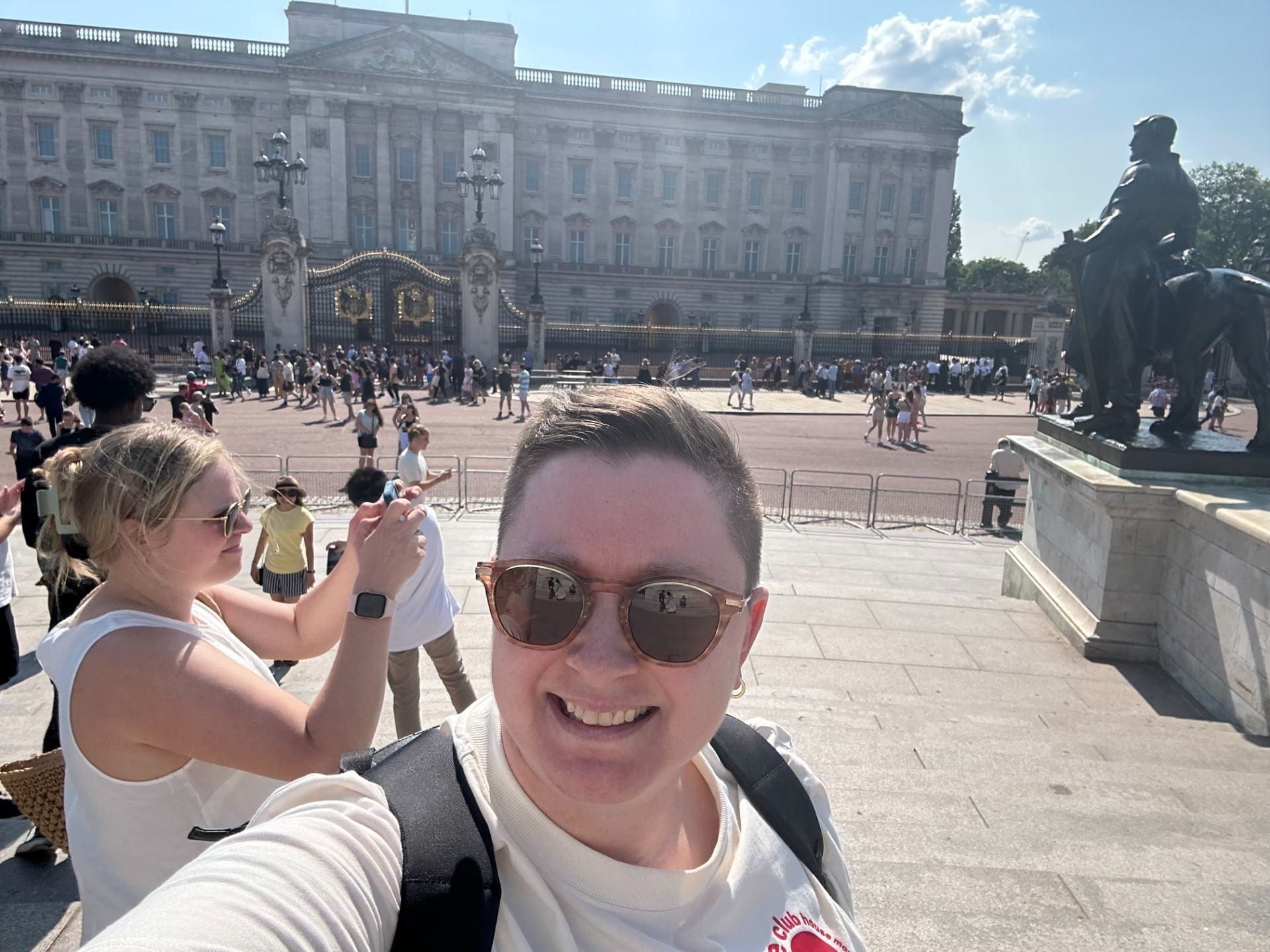Featured in the above photo: The group in front of Buckingham Palace.
By Carol Baillie (MA Environmental Resource Policy '23)
Studying abroad has been a goal of mine since I was a first-year college student back home in California. This was prior to joining the U.S. Coast Guard, which would lead me down the career path to where I am today at the U.S. Environmental Protection Agency (EPA) and as a part-time graduate student at The George Washington University. Studying abroad in London represents the journey I have been on in life to identify my goals and academic focus. In turn, the Short Term Study Away Program (STAP) UK experience meant many things to me.
Prior to departing for the UK, I was extremely nervous about leaving behind my service dog Norm as I have both physical and mental disabilities that he assists me with on a daily basis. Additionally, it was my first international trip without my wife to help guide me through the airport customs process. I prepared a briefing book with all of the materials from G&EE, the course information and lecture materials, travel details, etc. so I wouldn’t forget anything and was exhibiting the Coast Guard motto of “Semper Paratus” or “always ready.” Even though I meticulously prepared, the unexpected happened, a moment that will forever be etched into my memory for a multitude of reasons.

The author by the canal in Winchester, ancient capital of England.
At the end of the first official day of the program we were waiting in the lobby of KPMG when I heard the distinct sound of metal breaking. I felt an instant loosening of my carbon fiber ankle-foot orthosis (AFO) and broke into tears fearing the worst since I did not have a replacement brace with me or any materials to repair it. Instantly, without asking, several of my classmates rallied around me to lend assistance. First, they sat me down and encouraged me to relax as they worked to help find a temporary solution to fix the brace until we reached the hotel. Second, the magic of teamwork happened, my brace was “rigged” so I could continue to fully participate in the remainder of the day and program. I felt an overwhelming sense of emotions at once and the experience showed me that I could trust, something I struggle with in daily life.
Some of the biggest challenges associated with being a part-time Environmental Resource Policy graduate student were not only to make the STAP opportunity work with my job at the EPA, but also with leaving my comfort zone. My decision to study abroad was based on the following:
- Do I have enough work leave balance?
- Would I be able to study in a location that interested me?
- Would I be able to study material that aligns with my degree and career?
- Would I learn something new?
As a result, STAP UK: Business and the State was the best fit. This program served as an impetus for my recovery from my fourth surgery in three years among other “carrots”. I was determined to learn anything and everything while studying abroad including business-related topics (since it is a business course!), public-private partnerships, State owned enterprises (SOEs), and privatization of assets. What surprised me about the experience was learning not only about these topics but also about myself.
Two themes emerged in both the course theory and practice during the overseas program: net zero strategies and the role of public-private partnerships. Net zero strategy is the equivalent of climate change and greenhouse gas emissions reduction efforts in the US for those not familiar with the concept of climate change and environmental science.

STAP UK participants with Long Harbour speaker, Christophe de Taurines, BBA 1986
Christophe de Taurines at Long Harbour introduced net zero and the UK environmental, social, and governance (ESG) framework through the Fawley waterside project. It was interesting to learn how in practice, not just in theory, the UK in comparison to the US is far less progressive when it comes to net zero and ESG. Iit was quite shocking to be frank.
The US has no clear or enforceable national climate change standards in comparison to the UK’s net zero strategy. Furthermore, when I asked a question regarding responsible parties and the clean-up of land for the Fawley waterside project, the responsible party offered a fifty-year guarantee on the land cleanup free from contamination, a stark contrast to US standards for Superfund sites which have no guarantees. I left the meeting with Mr. Taurines more intrigued about ESG and net zero, particularly regarding his statement, “There is no ESG if it is not economically viable…there has to be economic incentives to be viable including incentives to be sustainable.” Is this true, even in the US? The answer is yes.
Utilities and privatization were first introduced in the pre-travel course readings by Dr. David Newbery in “Privatization, Restructuring, and Regulation of Utilities,” and later reinforced by Dr. Newbery in his lecture at Cambridge University regarding “Privatisation, Restructuring, Regulation and Reform of Electricity: progress to net-zero.” I was particularly interested in the lecture because it tied together both net zero and privatization of utilities (electricity in this case!), two topics I hoped to study.

Professor Sir David Newbery speaks to the STAP UK group at Cambridge University
Dr. Newbery’s two-part lecture explored how restructuring is essential prior to privatizing an asset which was right in line with his discussion in the pre-course reading materials. The entire lecture was extremely engaging, and I was impressed by the caliber of instruction my classmates and I were afforded through academic engagement at Cambridge University.
It pushed me to learn the role economics play in PPPs and regulation with privatization which is something I plan to share with my colleagues at the EPA. I’m glad that I took several economics courses in both my undergraduate and now graduate degree programs!
Through Dr. Newbery, I learned that to understand regulation, you can do so through the following equation: 𝑅𝑅 = 𝑏𝑏R + (1 − b)C and that it is applicable for public ownership and regulation. However, I also left his lecture with a new dream - I enjoyed Dr. Newbery’s lecture so much that I left wanting to pursue my PhD at Cambridge University in the future!

The author in front of Buckingham Palace.
Through the STAP UK experience, I also learned independence and that I can trust others to assist me in times of need. It is okay to ask for help and receive it. Overall, I am glad that I participated in this program and highly recommend it.


